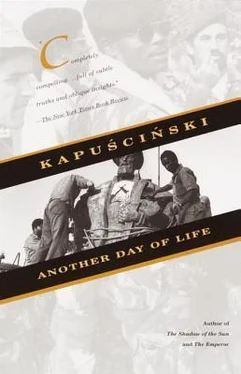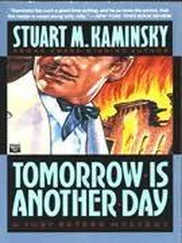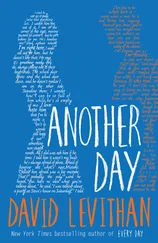I led them downstairs. They said that we would have our next meeting at their place, because it was awkward for them to come to the hotel where various people were hanging around. They would send a car for me when the time came. I asked what I was to call them. I was to call the black one Mauricio and the white one Pablo. But if I telephoned it would be better not to use any names; instead, say in Spanish that a friend wanted to meet them. They would see to the rest. In a dark side street stood a covered jeep, new, with no license plates. The hand of someone sitting inside opened the door. They got in and the jeep drove away.
But there at staff headquarters in Pretoria and later in Windhoek and finally (a small detail) at the front headquarters in Tsumeb, everything was precisely and capably thought out. Maps on the walls: Africa in miniature but still large, from floor to ceiling and from the entrance all along the commander ’s wall, with the uninhabited regions marked in a sandy color. The higher-ranking staff officers at the long tables: experts who know it all inside out.
The name of the operation: Orange.
The goal of the operation: to occupy Luanda by November 10, 1975 (at 1800 hours on that day, in accordance with the Alvor agreement, the last Portuguese units were to leave Angola). The next day, announce the independence of Angola, with power passing into the hands of an FNLA-UNITA coalition government.
Coordination: a strike from the south along the Tsumeb— Pereira d’Eça — Lubango — Benguela — Novo Redondo — Luanda road. A simultaneous strike from the north along the Maquela do Zombo — Carmona — Caxito — Luanda road. A simultaneous strike from the east along the Nova Lisboa— Quibala — Dondo — Luanda road.
Forces, southern flank: motorized units of the South African army (support: units of Portuguese volunteers, FNLA and UNITA units, the Chipenda force). Northern flank: FNLA units (support: units of the Republic of Zaïre army, units of Portuguese volunteers). Eastern flank: same as for the northern flank.
Zero hour —
(Here begins a discussion in English-Afrikaans-Portuguese. Two opinions collide. One faction favors beginning the action earlier, because the enemy might put up resistance; breaking down resistance takes time and could delay the occupation of Luanda. Besides, to the degree that moving into Angola will extend the army’s supply lines for ammunition, fuel, and food, it is necessary to allow additional time. They propose Monday, October 20, for zero hour. Others contend that the operation will not take more than two weeks. In the north we are already in the suburbs of Luanda. All information indicates that the enemy will not be able to mount any resistance in the south. We’ll move quickly in Panhard armored vehicles. It is enough to calculate the driving time of these vehicles from Tsumeb to Luanda and then factor in time for the units to have meals and sleep. They contend that a zero hour of October 27 will be sufficient. The first, more cautious variant finally prevails. Even if it takes three weeks, it will be a blitzkrieg to dazzle the world.)
Zero hour: Sunday, October 19.
On Sundays, as I mentioned, the country is immersed in a state of nonexistence and manifests no signs of life. Today, however, informed by an incomprehensible presentiment, Comandante Farrusco has been hunting his driver Antonio since morning and in the end Antonio has appeared on his own, sleepy and unconscious with exhaustion. Farrusco orders him to get behind the wheel and in the same red Toyota jeep that I returned from Pereira d’Eça in, they drive along the road through the bush. A while later they spot something in the rays of the sun that could almost be a phantom but quickly materializes and assumes the shape of a drawn-out column of armored vehicles above which hovers a bulging, nearly motionless helicopter. Another moment and the nervous rattling of machine guns rings out. Farrusco is badly wounded, shot through the lungs. Antonio is hit in the leg but remains conscious. He backs up and rushes in the opposite direction with his severely wounded commander.
The column moves forward toward Pereira d’Eça. The soldiers ride hidden inside the vehicles, but it must be hot and stuffy for them because — contrary to orders — here and there, in more and more of the armored personnel carriers, the hatch opens and a young, tanned face appears.
And in Luanda? What can you do on Sunday in our abandoned city, upon which — as it turns out — sentence has already been passed? You can sleep until noon.
You can turn on the faucet to check — ha! — just in case there is water.
You can stand before the mirror, thinking: so many gray hairs in my beard already.
You can sit in front of a plate on which lies a piece of disgusting fish and a spoonful of cold rice.
You can walk, sweating from weakness and effort, up the Rua Luis de Camões, toward the airport or down toward the bay.
And yet that’s not all — you can go to the movies, too! That’s right, because we still have a movie theater, only one in fact, but it is panoramic and in the open air and, to top it off, free. The theater lies in the northern part of town, near the front. The owner fled to Lisbon but the projectionist remained behind, and so did a print of the famous porno film Emmanuelle. The projectionist shows it uninterrupted, over and over, gratis, free for everyone, and crowds of kids rush in, and soldiers who have got away from the front, and there’s always a full house, a crush, and an uproar and indescribable bellowing. To enhance the effect, the projectionist stops the action at the hottest moments. The girl is naked— stop. He has her in the airplane — stop. She has her by the river — stop. The old man has her — stop. The boxer has her — stop. If he has her in an absurd position — laughter and bravos from the audience. If he has her in a position of exaggerated sophistication, the audience falls silent and analyzes. There’s so much merriment and hubbub that it is hard to hear the distant, heavy echoes of artillery on the nearby front. And of course there is no way — not because of Emmanuelle, but the great distance — to hear the roaring motors of the armored column moving along the road.
“When the dawn breaks, to Thee, O Lord, the earth sings.” A bad sign — Dona Cartagina is singing the Office of Our Lady. Since morning the whole city has been staggering and trembling, and the windowpanes are rattling because the artillery has opened fire all out: boom, boom, bash, whammerjammer, zoom, zoom, and the horizon is full of martial crashing. Holden Roberto has announced that he will enter Luanda today. He’s asked the populace to remain calm. Yesterday his planes dropped leaflets, pictures of Holden with the caption GOD RULES IN HEAVEN HOLDEN RULES ON EARTH.
They must be attacking in great strength, because the firing has not slackened since dawn and it is almost noon. In the city there is panic and nervous running around and shouting. It is fifteen minutes by car to the front line. They may get in. Dona Cartagina wants to hide me in her apartment. She lives near here: Go three blocks and take a right. I’m supposed to go now, and she will show me the way so I’ll know. I’ll be her son, caring for his elderly, ailing mother. And why do you speak such strange Portuguese? they ask. Because I was born in Timor but I ran away from home and went to live in Burma. I served in the Burmese navy and so I speak that language better.
Show us your documents!
I left my documents on the ship, and you know yourselves that all the ships have sailed away.
Dona Cartagina orders me to burn my papers and pack my suitcase but I tell her no, there’s still time, they might not come today.
I call the Cubans; no answer.
Читать дальше











